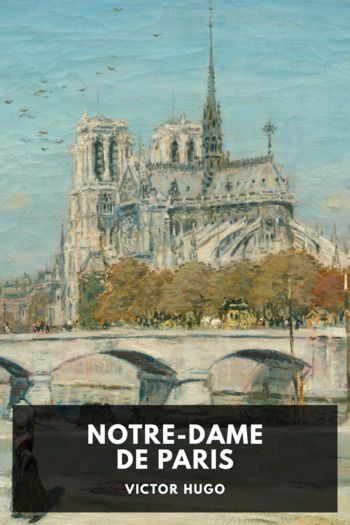Notre-Dame de Paris - Victor Hugo (diy ebook reader .txt) 📗

- Author: Victor Hugo
Book online «Notre-Dame de Paris - Victor Hugo (diy ebook reader .txt) 📗». Author Victor Hugo
The laughing group of children was already far away. The sacked nun sought with her eyes some passerby whom she might question. All at once, beside her cell, she perceived a priest making a pretext of reading the public breviary, but who was much less occupied with the “lectern of latticed iron,” than with the gallows, toward which he cast a fierce and gloomy glance from time to time. She recognized monsieur the archdeacon of Josas, a holy man.
“Father,” she inquired, “whom are they about to hang yonder?”
The priest looked at her and made no reply; she repeated her question. Then he said—
“I know not.”
“Some children said that it was a gypsy,” went on the recluse.
“I believe so,” said the priest.
Then Paquette la Chantefleurie burst into hyena-like laughter.
“Sister,” said the archdeacon, “do you then hate the gypsies heartily?”
“Do I hate them!” exclaimed the recluse, “they are vampires, stealers of children! They devoured my little daughter, my child, my only child! I have no longer any heart, they devoured it!”
She was frightful. The priest looked at her coldly.
“There is one in particular whom I hate, and whom I have cursed,” she resumed; “it is a young one, of the age which my daughter would be if her mother had not eaten my daughter. Every time that that young viper passes in front of my cell, she sets my blood in a ferment.”
“Well, sister, rejoice,” said the priest, icy as a sepulchral statue; “that is the one whom you are about to see die.”
His head fell upon his bosom and he moved slowly away.
The recluse writhed her arms with joy.
“I predicted it for her, that she would ascend thither! Thanks, priest!” she cried.
And she began to pace up and down with long strides before the grating of her window, her hair dishevelled, her eyes flashing, with her shoulder striking against the wall, with the wild air of a female wolf in a cage, who has long been famished, and who feels the hour for her repast drawing near.
VI Three Human Hearts Differently ConstructedPhoebus was not dead, however. Men of that stamp die hard. When Master Philippe Lheulier, advocate extraordinary of the king, had said to poor Esmeralda; “He is dying,” it was an error or a jest. When the archdeacon had repeated to the condemned girl; “He is dead,” the fact is that he knew nothing about it, but that he believed it, that he counted on it, that he did not doubt it, that he devoutly hoped it. It would have been too hard for him to give favorable news of his rival to the woman whom he loved. Any man would have done the same in his place.
It was not that Phoebus’s wound had not been serious, but it had not been as much so as the archdeacon believed. The physician, to whom the soldiers of the watch had carried him at the first moment, had feared for his life during the space of a week, and had even told him so in Latin. But youth had gained the upper hand; and, as frequently happens, in spite of prognostications and diagnoses, nature had amused herself by saving the sick man under the physician’s very nose. It was while he was still lying on the leech’s pallet that he had submitted to the interrogations of Philippe Lheulier and the official inquisitors, which had annoyed him greatly. Hence, one fine morning, feeling himself better, he had left his golden spurs with the leech as payment, and had slipped away. This had not, however, interfered with the progress of the affair. Justice, at that epoch, troubled itself very little about the clearness and definiteness of a criminal suit. Provided that the accused was hung, that was all that was necessary. Now the judge had plenty of proofs against la Esmeralda. They had supposed Phoebus to be dead, and that was the end of the matter.
Phoebus, on his side, had not fled far. He had simply rejoined his company in garrison at Queue-en-Brie, in the Isle-de-France, a few stages from Paris.
After all, it did not please him in the least to appear in this suit. He had a vague feeling that he should play a ridiculous figure in it. On the whole, he did not know what to think of the whole affair. Superstitious, and not given to devoutness, like every soldier who is only a soldier, when he came to question himself about this adventure, he did not feel assured as to the goat, as to the singular fashion in which he had met La Esmeralda, as to the no less strange manner in which she had allowed him to divine her love, as to her character as a gypsy, and lastly, as to the surly monk. He perceived in all these incidents much more magic than love, probably a sorceress, perhaps the devil; a comedy, in short, or to speak in the language of that day, a very disagreeable mystery, in which he played a very awkward part, the role of blows and derision. The captain was quite put out of countenance about it; he experienced that sort of shame which our La Fontaine has so admirably defined—
Ashamed as a fox who has been caught by a fowl.
Moreover, he hoped that the affair would not get noised abroad, that his name would hardly be pronounced in it, and that in any case it would not go beyond the courts of the Tournelle. In this he was not mistaken, there was then no Gazette des Tribunaux; and as not a week passed which had





Comments (0)